西风颂赏析(中英文)
- 格式:ppt
- 大小:17.14 MB
- 文档页数:22
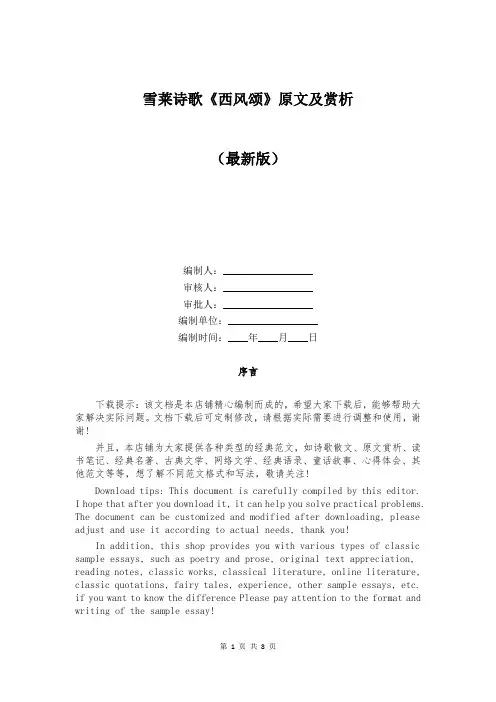
雪莱诗歌《西风颂》原文及赏析(最新版)编制人:__________________审核人:__________________审批人:__________________编制单位:__________________编制时间:____年____月____日序言下载提示:该文档是本店铺精心编制而成的,希望大家下载后,能够帮助大家解决实际问题。
文档下载后可定制修改,请根据实际需要进行调整和使用,谢谢!并且,本店铺为大家提供各种类型的经典范文,如诗歌散文、原文赏析、读书笔记、经典名著、古典文学、网络文学、经典语录、童话故事、心得体会、其他范文等等,想了解不同范文格式和写法,敬请关注!Download tips: This document is carefully compiled by this editor.I hope that after you download it, it can help you solve practical problems. The document can be customized and modified after downloading, please adjust and use it according to actual needs, thank you!In addition, this shop provides you with various types of classic sample essays, such as poetry and prose, original text appreciation, reading notes, classic works, classical literature, online literature, classic quotations, fairy tales, experience, other sample essays, etc. if you want to know the difference Please pay attention to the format and writing of the sample essay!雪莱诗歌《西风颂》原文及赏析【导语】:一哦,犷野的西风,秋之实体的气息! 由于你无形无影的出现,万木萧疏, 似鬼魅避驱魔巫师,蔫黄,魃黑, 苍白,潮红,疫疠摧残的落叶无数, 四散飘舞;哦,你又把有翅的种籽, 凌空运送到他们黑暗的越冬一哦,犷野的西风,秋之实体的气息!由于你无形无影的出现,万木萧疏,似鬼魅避驱魔巫师,蔫黄,魃黑,苍白,潮红,疫疠摧残的落叶无数,四散飘舞;哦,你又把有翅的种籽,凌空运送到他们黑暗的越冬床圃;仿佛是一具具僵卧在坟墓里的尸体,他们将分别蛰伏,冷落而又凄凉,直到阳春你蔚蓝的姐妹向梦中的大地吹响她嘹亮的号角(如同放牧群羊,驱送香甜的花蕾到空气中觅食就饮)给高山平原注满生命的色彩和芬芳。
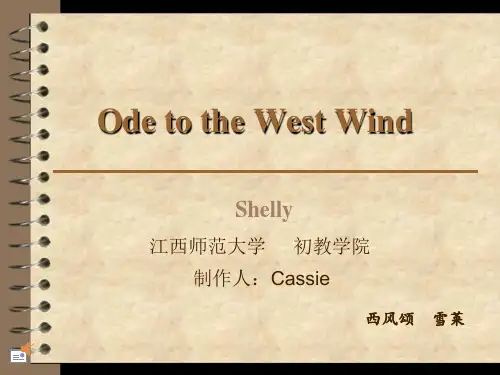
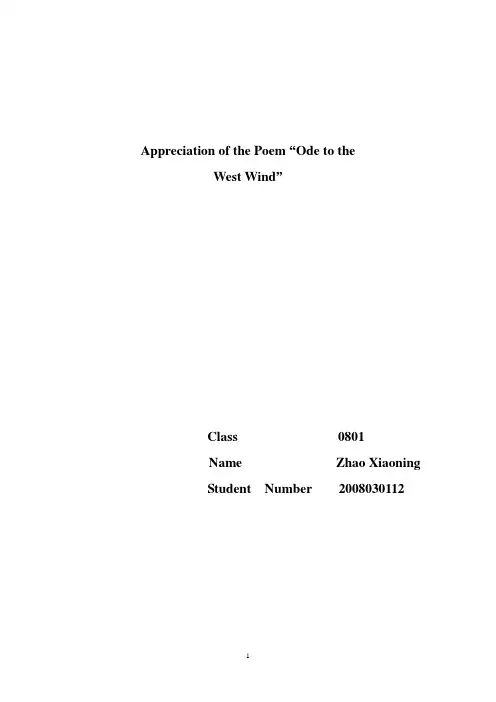
Appreciation of the Poem “Ode to theWest Wind”Class 0801Name Zhao XiaoningStudent Number 2008030112Abstract... ... ... ... ... ... ... ... ... ... ... ... ... ... ... ... ... ... ... ... ... ... ... ... ... ... ... ... ...( 3) 摘要... ... ... ... ... ... ... ... ... ... ... ... ... ... ... ... ... ... ... ... ... ... ... ... ... ... ... ... ...( 4)1. Introduction... ... ... ... ... ... ... ... ... ... ... ... ... ... ... ... ... ... ... ... ... ... ... ... ... ( 5)2. Appreciation to the Ode to the West Wind… … … … … … … ( 5 )3. Conclusion… … … … … … … … … … … … … … … … … … … … ( 6)4. Bibliography… … … … … … … … … … … … … … … … … … … … ( 7 )Abstract:Ode to the West Wind is the most classical works of Shelley The poet came up with the thought when he is walking in a forest and a strong storm seemed to come soon. And the storm came together with wind and hails. In such weather Shelley thought of many things of the society. Under this atmosphere he wrote the poem “Ode to the West Wind”.Key Words:Lyric image aesthetics the west wind摘要:《西风颂》是雪莱最为经典的作品. 当诗人漫步于森林中,一场暴风雨即将来临,此时此景,诗人深有感触,当时正处于欧洲的革命风暴中,于是,千古名篇《西风颂》诞生了。
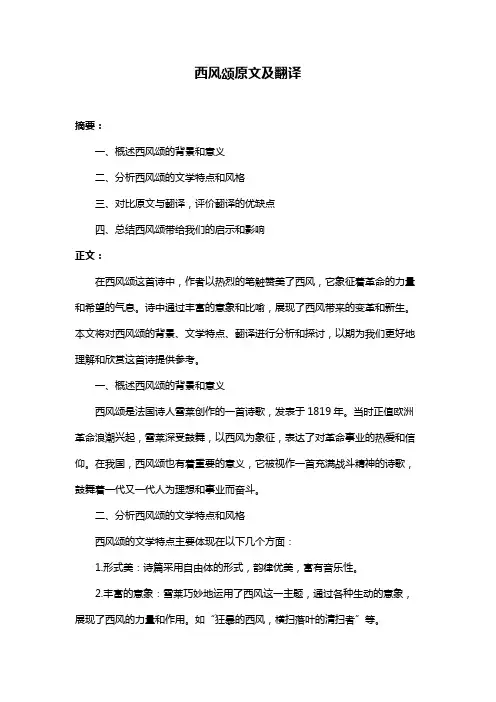
西风颂原文及翻译摘要:一、概述西风颂的背景和意义二、分析西风颂的文学特点和风格三、对比原文与翻译,评价翻译的优缺点四、总结西风颂带给我们的启示和影响正文:在西风颂这首诗中,作者以热烈的笔触赞美了西风,它象征着革命的力量和希望的气息。
诗中通过丰富的意象和比喻,展现了西风带来的变革和新生。
本文将对西风颂的背景、文学特点、翻译进行分析和探讨,以期为我们更好地理解和欣赏这首诗提供参考。
一、概述西风颂的背景和意义西风颂是法国诗人雪莱创作的一首诗歌,发表于1819年。
当时正值欧洲革命浪潮兴起,雪莱深受鼓舞,以西风为象征,表达了对革命事业的热爱和信仰。
在我国,西风颂也有着重要的意义,它被视作一首充满战斗精神的诗歌,鼓舞着一代又一代人为理想和事业而奋斗。
二、分析西风颂的文学特点和风格西风颂的文学特点主要体现在以下几个方面:1.形式美:诗篇采用自由体的形式,韵律优美,富有音乐性。
2.丰富的意象:雪莱巧妙地运用了西风这一主题,通过各种生动的意象,展现了西风的力量和作用。
如“狂暴的西风,横扫落叶的清扫者”等。
3.比喻和象征:雪莱将西风比喻为“破坏者”和“建设者”,象征革命的力量既具有破坏性,又具有建设性。
4.抒发热情:诗中充满了雪莱对西风的热爱和赞美之情,展现出革命者坚定的信念和一往无前的勇气。
三、对比原文与翻译,评价翻译的优缺点原文:O wild west wind, thou breath of autumn"s fire,Thou art the dirge of nature"s dying.译文:哦,狂暴的西风,你秋天火焰的气息,你是大自然逝去的悲歌。
从翻译来看,这首诗的译文较好地保留了原文的意境和情感。
在语言表达上,译文采用了自由体的形式,较为贴近原文的韵律。
同时,译文通过“秋天火焰的气息”和“大自然逝去的悲歌”两个意象,传达了原文中西风的象征意义。
然而,在表达某些细腻的情感方面,译文略显不足,如原文中的“dirge”一词,译为“悲歌”略显单一,不妨考虑译为“挽歌”或“哀歌”,更能表达出原文中的忧伤之情。
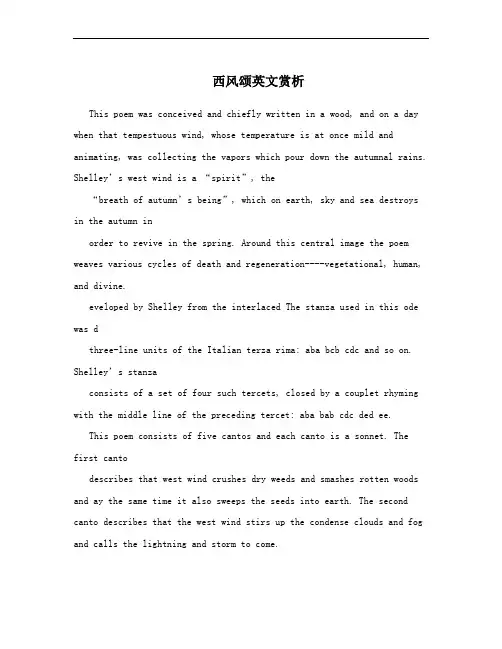
西风颂英文赏析This poem was conceived and chiefly written in a wood, and on a day when that tempestuous wind, whose temperature is at once mild and animating, was collecting the vapors which pour down the autumnal rains. Shelley’s west wind is a “spirit”, the“breath of autumn’s being”, which on earth, sky and sea destroys in the autumn inorder to revive in the spring. Around this central image the poem weaves various cycles of death and regeneration----vegetational, human, and divine.eveloped by Shelley from the interlaced The stanza used in this ode was dthree-line units of the Italian terza rima: aba bcb cdc and so on. Shelley’s stanzaconsists of a set of four such tercets, closed by a couplet rhyming with the middle line of the preceding tercet: aba bab cdc ded ee.This poem consists of five cantos and each canto is a sonnet. Thefirst cantodescribes that west wind crushes dry weeds and smashes rotten woods and ay the same time it also sweeps the seeds into earth. The second canto describes that the west wind stirs up the condense clouds and fog and calls the lightning and storm to come.The third canto describes the power of the west wind in land, sea and air. The fourth canto is a turning point, Shelley’s poem turns from describing scene to expressingemotions and he conveys his willing with the west wind. The last canto is the climax of the poem, in it Shelley further expresses the wind will destroy everything.All in all, it can be divided into two parts. The first part include canto one, canto two and canto three. The first part gives a description of many images but there isonly one central idea. That is the west wind has a strong power to eliminate decadent and encourage the new things. The last two cantos are Shelley speaking directly to the wind, asking for its power, to lift him like a leaf, a cloud or a wave and make him its companion in its wanderings.Symbolism is widely used in this poem. This poem describes the west wind from the beginning to the end. Whether it describes the scenery or expresses his thoughts, the west wind is indispensable in his descriptions. From the surface it seems that Shelley writes about the west wind but actually he uses the west wind to express the revolution. What the author describes about the nature is exactly what he wants to say about the revolution. The descriptions of the conditions of the seeds, the leaves, the clouds, the lightning, the sea and all other images in this poem are symbol of the development of the revolution.In this poem, Shelley sings in praise of the west wind. The west wind is not only a destroyer but also a protector. It not only crushes dry weeds and smashes rottenwoods but also sweeps the seeds into earth. In fact, by singing in praise of the westwind, he sings in praise of the revolution that sweeps over the whole Europe. He sings in praise of the revolution which fights against all the dark forces in the old world. Shelley love the west wind, he looks forward to the coming of the west wind. It is his soul and he combines himself with the west wind. The measures that Shelley hope the west wind do and the west wind has done are what he hope the revolution and himself can do. In the fourth canto the sentence “I fall upon the thorns of life! I bleed!”expresses that the author willing to devote himself to the revolution. The last sentence “If Winter comes, can spring be far behind?” expresses his convictionto the life and his determination to the revolution. In this poem, the west wind has become a symbolic. It is a kind of universe spirit, a spirit that will break the old world and pursue the new world.。
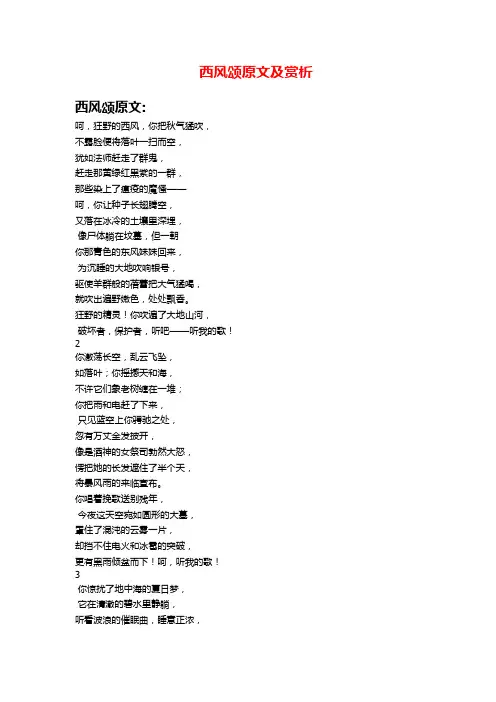
西风颂原文及赏析西风颂原文:呵,狂野的西风,你把秋气猛吹,不露脸便将落叶一扫而空,犹如法师赶走了群鬼,赶走那黄绿红黑紫的一群,那些染上了瘟疫的魔慅——呵,你让种子长翅腾空,又落在冰冷的土壤里深埋,像尸体躺在坟墓,但一朝你那青色的东风妹妹回来,为沉睡的大地吹响银号,驱使羊群般的蓓蕾把大气猛喝,就吹出遍野嫩色,处处飘香。
狂野的精灵!你吹遍了大地山河,破坏者,保护者,听吧——听我的歌!2你激荡长空,乱云飞坠,如落叶;你摇撼天和海,不许它们象老树缠在一堆;你把雨和电赶了下来,只见蓝空上你骋驰之处,忽有万丈金发披开,像是酒神的女祭司勃然大怒,愣把她的长发遮住了半个天,将暴风雨的来临宣布。
你唱着挽歌送别残年,今夜这天空宛如圆形的大墓,罩住了混沌的云雾一片,却挡不住电火和冰雹的突破,更有黑雨倾盆而下!呵,听我的歌!3你惊扰了地中海的夏日梦,它在清澈的碧水里静躺,听看波浪的催眠曲,睡意正浓,朦胧里它看见南国港外石岛旁,烈日下古老的宫殿和楼台,把影子投在海水里晃荡,它们的墙上长满花朵和藓苔,那香气光想想也叫人醉倒!你的来临叫大西洋也惊骇,它忙把海水劈成两半,为你开道,海底下有琼枝玉树安卧,尽管深潜万丈,一听你的怒号,就闻声而变色,只见一个个战栗,畏缩——呵,听我的歌!4如果我能是一片落叶随你飘腾,如果我能是一朵流云伴你飞行,或是一个浪头在你的威力下翻滚,如果我能有你的锐势和冲劲,即使比不上你那不羁的奔放,但只要能拾回我当年的童心,我就能陪着你遨游天上,那时候追上你未必是梦呓,又何至沦落到这等颓丧,祈求你来救我之急!呵,卷走我吧,象卷落叶,波浪,流云!我跌在人生的刺树上,我血流遍体!岁月沉重如铁链,压着的灵魂原本同你一样:髙傲,飘逸,不驯。
5让我做你的竖琴吧,就同森林一般,纵然我们都叶落纷纷,又有何妨!我们身上的秋色斑烂,好给你那狂飙曲添上深沉的回响,甜美而带苍凉。
给我你迅猛的劲头!豪迈的精灵,化成我吧,借你的锋芒,把我的腐朽思想扫出宇宙,扫走了枯叶好把新生来激发;凭着我这诗韵做符咒,犹如从未灭的炉头吹出火花,把我的话散布在人群之中!对那沉睡的大地,拿我的嘴当喇叭,吹响一个预言!呵,西风,如果冬天已到,难道春天还用久等?西风颂赏析:这是一首写于19世纪的奇特的原始诗,这里不是说其语言或形式是原始的,而是指其思维方式而言。
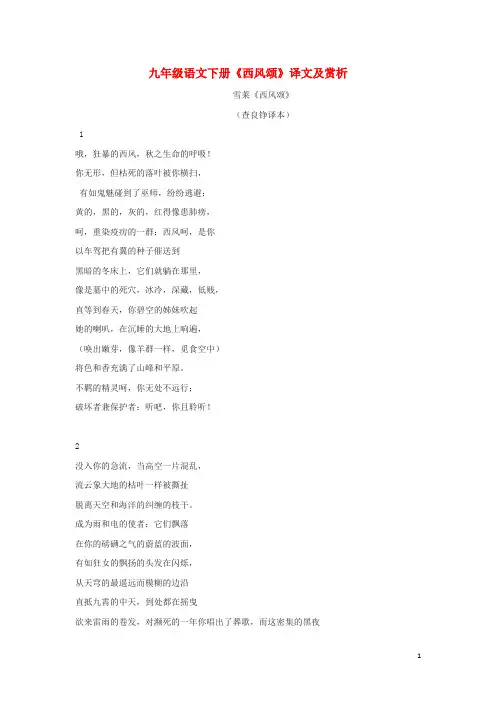
九年级语文下册《西风颂》译文及赏析雪莱《西风颂》(查良铮译本)1哦,狂暴的西风,秋之生命的呼吸!你无形,但枯死的落叶被你横扫,有如鬼魅碰到了巫师,纷纷逃避:黄的,黑的,灰的,红得像患肺痨,呵,重染疫疠的一群:西风呵,是你以车驾把有翼的种子催送到黑暗的冬床上,它们就躺在那里,像是墓中的死穴,冰冷,深藏,低贱,直等到春天,你碧空的姊妹吹起她的喇叭,在沉睡的大地上响遍,(唤出嫩芽,像羊群一样,觅食空中)将色和香充满了山峰和平原。
不羁的精灵呵,你无处不远行;破坏者兼保护者:听吧,你且聆听!2没入你的急流,当高空一片混乱,流云象大地的枯叶一样被撕扯脱离天空和海洋的纠缠的枝干。
成为雨和电的使者:它们飘落在你的磅礴之气的蔚蓝的波面,有如狂女的飘扬的头发在闪烁,从天穹的最遥远而模糊的边沿直抵九霄的中天,到处都在摇曳欲来雷雨的卷发,对濒死的一年你唱出了葬歌,而这密集的黑夜将成为它广大墓陵的一座圆顶,里面正有你的万钧之力的凝结;那是你的浑然之气,从它会迸涌黑色的雨,冰雹和火焰:哦,你听!3是你,你将蓝色的地中海唤醒,而它曾经昏睡了一整个夏天,被澄澈水流的回旋催眠入梦,就在巴亚海湾的一个浮石岛边,它梦见了古老的宫殿和楼阁在水天辉映的波影里抖颤,而且都生满青苔、开满花朵,那芬芳真迷人欲醉!呵,为了给你让一条路,大西洋的汹涌的浪波把自己向两边劈开,而深在渊底那海洋中的花草和泥污的森林虽然枝叶扶疏,却没有精力;听到你的声音,它们已吓得发青:一边颤栗,一边自动萎缩:哦,你听!4哎,假如我是一片枯叶被你浮起,假如我是能和你飞跑的云雾,是一个波浪,和你的威力同喘息,假如我分有你的脉搏,仅仅不如你那么自由,哦,无法约束的生命!假如我能像在少年时,凌风而舞便成了你的伴侣,悠游天空(因为呵,那时候,要想追你上云霄,似乎并非梦幻),我就不致像如今这样焦躁地要和你争相祈祷。
哦,举起我吧,当我是水波、树叶、浮云!我跌在生活底荆棘上,我流血了!这被岁月的重轭所制服的生命原是和你一样:骄傲、轻捷而不驯。
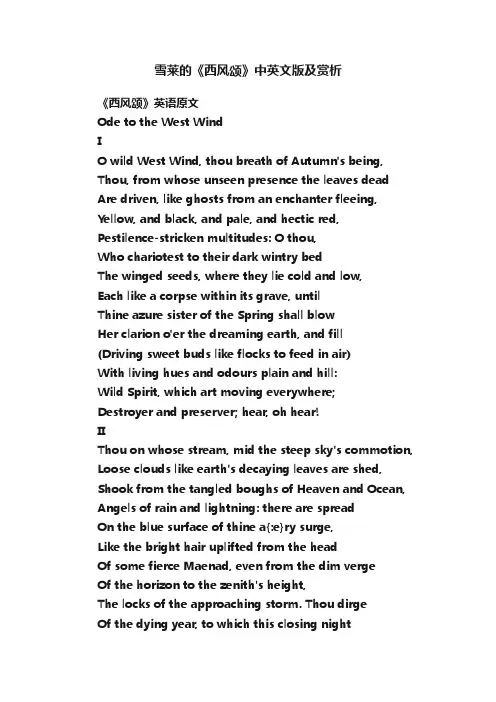
雪莱的《西风颂》中英文版及赏析《西风颂》英语原文Ode to the West WindIO wild West Wind, thou breath of Autumn's being, Thou, from whose unseen presence the leaves dead Are driven, like ghosts from an enchanter fleeing, Yellow, and black, and pale, and hectic red, Pestilence-stricken multitudes: O thou,Who chariotest to their dark wintry bedThe winged seeds, where they lie cold and low,Each like a corpse within its grave, untilThine azure sister of the Spring shall blowHer clarion o'er the dreaming earth, and fill(Driving sweet buds like flocks to feed in air)With living hues and odours plain and hill:Wild Spirit, which art moving everywhere;Destroyer and preserver; hear, oh hear!IIThou on whose stream, mid the steep sky's commotion, Loose clouds like earth's decaying leaves are shed, Shook from the tangled boughs of Heaven and Ocean, Angels of rain and lightning: there are spreadOn the blue surface of thine a{:e}ry surge,Like the bright hair uplifted from the headOf some fierce Maenad, even from the dim vergeOf the horizon to the zenith's height,The locks of the approaching storm. Thou dirgeOf the dying year, to which this closing nightWill be the dome of a vast sepulchre,Vaulted with all thy congregated mightOf vapours, from whose solid atmosphere Black rain, and fire, and hail will burst: oh hear! IIIThou who didst waken from his summer dreams The blue Mediterranean, where he lay,Lull'd by the coil of his cryst{`a}lline streams, Beside a pumice isle in Baiae's bay,And saw in sleep old palaces and towers Quivering within the wave's intenser day,All overgrown with azure moss and flowersSo sweet, the sense faints picturing them! Thou For whose path the Atlantic's level powers Cleave themselves into chasms, while far below The sea-blooms and the oozy woods which wear The sapless foliage of the ocean, knowThy voice, and suddenly grow gray with fear, And tremble and despoil themselves: oh hear!IVIf I were a dead leaf thou mightest bear;If I were a swift cloud to fly with thee;A wave to pant beneath thy power, and share The impulse of thy strength, only less free Than thou, O uncontrollable! If evenI were as in my boyhood, and could beThe comrade of thy wanderings over Heaven, As then, when to outstrip thy skiey speed Scarce seem'd a vision; I would ne'er have strivenAs thus with thee in prayer in my sore need. Oh, lift me as a wave, a leaf, a cloud!I fall upon the thorns of life! I bleed!A heavy weight of hours has chain'd and bow'd One too like thee: tameless, and swift, and proud.VMake me thy lyre, even as the forest is:What if my leaves are falling like its own!The tumult of thy mighty harmoniesWill take from both a deep, autumnal tone, Sweet though in sadness. Be thou, Spirit fierce, My spirit! Be thou me, impetuous one!Drive my dead thoughts over the universeLike wither'd leaves to quicken a new birth! And, by the incantation of this verse,Scatter, as from an unextinguish'd hearth Ashes and sparks, my words among mankind! Be through my lips to unawaken'd earthThe trumpet of a prophecy! O Wind,If Winter comes, can Spring be far behind?《西风颂》中文译文西风颂一哦,狂野的西风,秋之实体的气息!由于你无形无影的出现,万木萧疏,似鬼魅逃避驱魔巫师,蔫黄,黢黑,苍白,潮红,疫疠摧残的落叶无数,四散飘舞;哦,你又把有翅的种籽凌空运送到他们黑暗的越冬床圃;仿佛是一具具僵卧在坟墓里的尸体,他们将分别蛰伏,冷落而又凄凉,直到阳春你蔚蓝的姐妹向梦中的大地吹响她嘹亮的号角(如同牧放群羊驱送香甜的花蕾到空气中觅食就饮)给高山平原注满生命的色彩和芬芳。
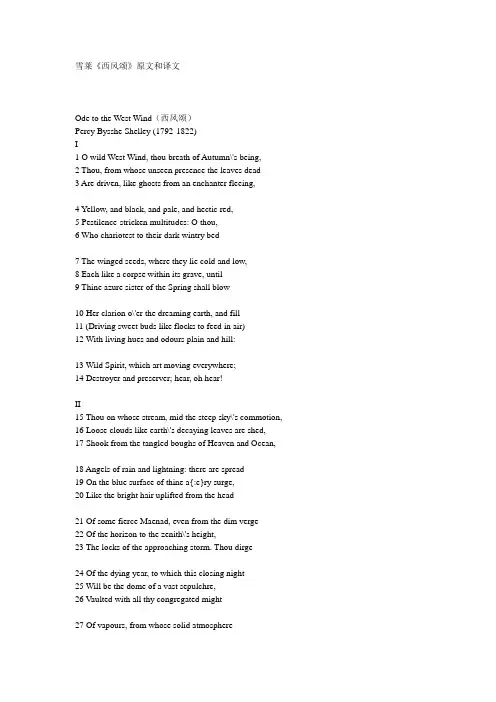
雪莱《西风颂》原文和译文Ode to the West Wind(西风颂)Percy Bysshe Shelley (1792-1822)I1 O wild West Wind, thou breath of Autumn\'s being,2 Thou, from whose unseen presence the leaves dead3 Are driven, like ghosts from an enchanter fleeing,4 Yellow, and black, and pale, and hectic red,5 Pestilence-stricken multitudes: O thou,6 Who chariotest to their dark wintry bed7 The winged seeds, where they lie cold and low,8 Each like a corpse within its grave, until9 Thine azure sister of the Spring shall blow10 Her clarion o\'er the dreaming earth, and fill11 (Driving sweet buds like flocks to feed in air)12 With living hues and odours plain and hill:13 Wild Spirit, which art moving everywhere;14 Destroyer and preserver; hear, oh hear!II15 Thou on whose stream, mid the steep sky\'s commotion,16 Loose clouds like earth\'s decaying leaves are shed,17 Shook from the tangled boughs of Heaven and Ocean,18 Angels of rain and lightning: there are spread19 On the blue surface of thine a{:e}ry surge,20 Like the bright hair uplifted from the head21 Of some fierce Maenad, even from the dim verge22 Of the horizon to the zenith\'s height,23 The locks of the approaching storm. Thou dirge24 Of the dying year, to which this closing night25 Will be the dome of a vast sepulchre,26 Vaulted with all thy congregated might27 Of vapours, from whose solid atmosphere28 Black rain, and fire, and hail will burst: oh hear!III29 Thou who didst waken from his summer dreams30 The blue Mediterranean, where he lay,31 Lull\'d by the coil of his cryst{`a}lline streams,32 Beside a pumice isle in Baiae\'s bay,33 And saw in sleep old palaces and towers34 Quivering within the wave\'s intenser day,35 All overgrown with azure moss and flowers36 So sweet, the sense faints picturing them! Thou37 For whose path the Atlantic\'s level powers38 Cleave themselves into chasms, while far below39 The sea-blooms and the oozy woods which wear40 The sapless foliage of the ocean, know41 Thy voice, and suddenly grow gray with fear,42 And tremble and despoil themselves: oh hear!IV43 If I were a dead leaf thou mightest bear;44 If I were a swift cloud to fly with thee;45 A wave to pant beneath thy power, and share46 The impulse of thy strength, only less free47 Than thou, O uncontrollable! If even48 I were as in my boyhood, and could be49 The comrade of thy wanderings over Heaven,50 As then, when to outstrip thy skiey speed51 Scarce seem\'d a vision; I would ne\'er have striven52 As thus with thee in prayer in my sore need.53 Oh, lift me as a wave, a leaf, a cloud!54 I fall upon the thorns of life! I bleed!55 A heavy weight of hours has chain\'d and bow\'d56 One too like thee: tameless, and swift, and proud.57 Make me thy lyre, even as the forest is:58 What if my leaves are falling like its own!59 The tumult of thy mighty harmonies60 Will take from both a deep, autumnal tone,61 Sweet though in sadness. Be thou, Spirit fierce,62 My spirit! Be thou me, impetuous one!63 Drive my dead thoughts over the universe64 Like wither\'d leaves to quicken a new birth!65 And, by the incantation of this verse,66 Scatter, as from an unextinguish\'d hearth67 Ashes and sparks, my words among mankind!68 Be through my lips to unawaken\'d earth69 The trumpet of a prophecy! O Wind,70 If Winter comes, can Spring be far behind?西风颂雪莱一剽悍的西风啊, 你是暮秋的呼吸,因你无形的存在, 枯叶四处逃窜,如同魔鬼见到了巫师, 纷纷躲避;那些枯叶, 有黑有白, 有红有黄,像遭受了瘟疫的群体, 哦, 你呀,西风, 你让种籽展开翱翔的翅膀,飞落到黑暗的冬床, 冰冷地躺下,像一具具尸体深葬于坟墓, 直到你那蔚蓝色的阳春姐妹凯旋归家,向睡梦中的大地吹响了她的号角,催促蓓蕾, 有如驱使吃草的群羊,让漫山遍野注满生命的芳香色调;剽悍的精灵, 你的身影遍及四方, 哦,听吧, 你既在毁坏, 又在保藏!二在你的湍流中, 在高空的骚动中, 纷乱的云块就像飘零飞坠的叶子, 你从天空和海洋相互交错的树丛抖落出传送雷雨以及闪电的天使; 在你的气体波涛的蔚蓝色的表面, 恰似酒神女祭司的头上竖起缕缕亮闪闪的青丝, 从朦胧的地平线一直到苍天的顶端, 全都披散着即将来临的一场暴风骤雨的发卷,你就是唱给垂死岁月的一曲挽歌, 四合的夜幕, 是巨大墓陵的拱顶, 它建构于由你所集聚而成的气魄,可是从你坚固的气势中将会喷迸黑雨、电火以及冰雹; 哦, 请听!三你啊, 把蓝色的地中海从夏梦中唤醒, 它曾被清澈的水催送入眠, 就一直躺在那个地方, 酣睡沉沉,睡在拜伊海湾的一个石岛的旁边, 在睡梦中看到古老的宫殿和楼台在烈日之下的海波中轻轻地震颤,它们全都开满鲜花, 又生满青苔, 散发而出的醉人的芳香难以描述!见到你, 大西洋的水波豁然裂开,为你让出道路, 而在海底的深处, 枝叶里面没有浆汁的淤泥的丛林和无数的海花、珊瑚, 一旦听出你的声音, 一个个顿时胆战心惊, 颤栗着, 像遭了劫掠, 哦, 请听!四假如我是一片任你吹卷的枯叶,假若我是一朵随你飘飞的云彩,或是在你威力之下喘息的水波,分享你强健的搏动, 悠闲自在,不羁的风啊, 哪怕不及你自由,或者, 假若我能像童年的时代,陪伴着你在那天国里任意翱游,即使比你飞得更快也并非幻想── 那么我绝不向你这般苦苦哀求:啊, 卷起我吧! 如同翻卷波浪、或像横扫落叶、或像驱赶浮云! 我跃进人生的荆棘, 鲜血直淌!岁月的重负缚住了我这颗灵魂,它太像你了:敏捷、高傲、不驯。
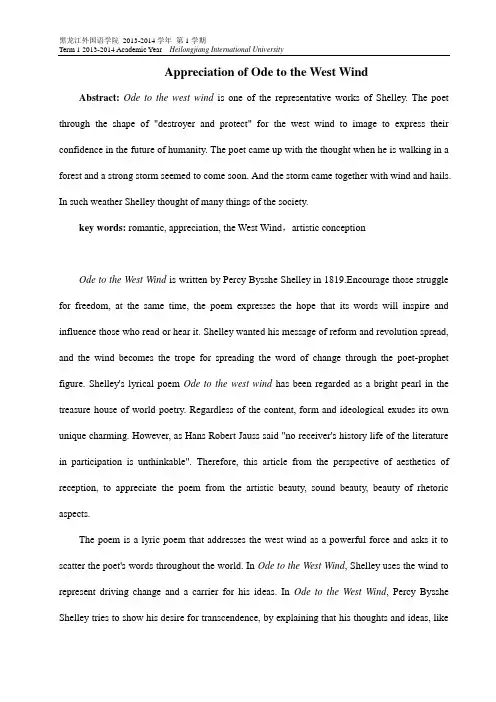
Appreciation of Ode to the West WindAbstract:Ode to the west wind is one of the representative works of Shelley. The poet through the shape of "destroyer and protect" for the west wind to image to express their confidence in the future of humanity. The poet came up with the thought when he is walking in a forest and a strong storm seemed to come soon. And the storm came together with wind and hails. In such weather Shelley thought of many things of the society.key words: romantic, appreciation, the West Wind,artistic conceptionOde to the West Wind is written by Percy Bysshe Shelley in 1819.Encourage those struggle for freedom, at the same time, the poem expresses the hope that its words will inspire and influence those who read or hear it. Shelley wanted his message of reform and revolution spread, and the wind becomes the trope for spreading the word of change through the poet-prophet figure. Shelley's lyrical poem Ode to the west wind has been regarded as a bright pearl in the treasure house of world poetry. Regardless of the content, form and ideological exudes its own unique charming. However, as Hans Robert Jauss said "no receiver's history life of the literature in participation is unthinkable". Therefore, this article from the perspective of aesthetics of reception, to appreciate the poem from the artistic beauty, sound beauty, beauty of rhetoric aspects.The poem is a lyric poem that addresses the west wind as a powerful force and asks it to scatter the poet's words throughout the world. In Ode to the West Wind, Shelley uses the wind to represent driving change and a carrier for his ideas. In Ode to the West Wind, Percy Bysshe Shelley tries to show his desire for transcendence, by explaining that his thoughts and ideas, likethe 'winged seeds' are trapped. The West Wind acts as a force for change and forward movement in the human and natural world. It is safe to say that anyone who read the poem will be inspired an influenced by it. As Shelley wanted the belief of reform and revolution to be heard, the wind became the horn to call people to fight for their freedom. Meanwhile the poem is also a lyric poem which the poet use many symbols to express his belief.Poetry begins from the images. Because "conception on image". "The first section of the main image of Ode to the west wind is "wild West Wind" and "the leaves dead". This section mainly describes the westerly wind swept the forest leaf, blowing the seeds of life scene. The poem like ghosts from an enchanter fleeing, "The winged seeds" by the west wind volley transported to their dark wintry bed.In the second section, the poet used the "clouds/vapours/rain/Black rain", "lighting", "fair", "hail" these images, in order to show the tremendous momentum west wind, and it and other images together in nature. West wind mixed the sky clouds, called a lightning storm. Especially the last two lines in the black rain and fire and hail will burst, is a destructive force west wind, it is a thunderstorm brewing in this section.In the third section, the image is "the blue Mediterranean", "waves", "old palaces and towers", let the wind and these images together, forming a west wind will chop wave of one scene. It indicates that the revolution will be raging like a storm, and belongs to the old world will grow gray, tremble and despoil themselves. Thus, west wind became the maker of disturbance in finally .Shelley also changes his use of metaphors in this canto. In the first cantos the wind was a metaphor explained at full length. Now the metaphors are only weakly presented –“the thorns oflife”. Shelley also leaves out the fourth element: the fire. In the previous cantos he wrote about the earth, the air and the water. The reader now expects the fire – but it is not there. This leads to a break in the symmetry.Again the wind is very important in this last canto. At the beginning of the poem the wind was only capable of blowing the leaves from the trees. In the previous canto the poet identified himself with the leaves. In this canto the wind is now capable of using both of these things mentioned before.At present, the main theme of the whole poem --hope struggle and future. In the last section, the poet want to express their love of the west wind and yearning, put yourself together to west wind, he hopes you can like wind, and be through my lips to unawak-ened earth. The last line of "If Winter comes, can Spring be far behind?" is the eternal and famous revolutionary atmosphere. It towards to the people that the ending is destruction and preservation of West Wind: The dark will be the past, hope is on the front.Ode to the west wind center imagery in this poem, it became a symbol of inspiration of life unknown force, which is a kind of infinite great strength can rule the world. West wind is "Shelley destroyer is saved", it is not only the symbol withered autumn, is also the upcoming life a symbol of spring.Poetry is called "with the thought of music". Luis Simpson in his book once pointed out: Thinking of poetry is expressed by the rhythm. The rhythmic sound generation poetry music, the poetry language language play a variety of ideographic function. This poem is a highly controlled text about the role of the poet as the agent of political and moral change. This was a subject Shelley wrote a great deal about, especially around 1819, with this strongest version of itarticulated the last famous lines of his "Defence of Poetry": "Poets are the hierophants of an unapprehended inspiration; the mirrors of the gigantic shadows which futurity casts upon the present; the words which express what they understand not; the trumpets which sing to battle, and feel not what they inspire; the influence which is moved not, but moves. Poets are the unacknowledged legislators of the world."In Ode to the West Wind, Percy Bysshe Shelley tries to show his desire for transcendence, by explaining that his thoughts and ideas, like the winged seeds are trapped. The West Wind acts as a force for change and forward movement in the human and natural world.Shelley sees winter not just as the last season of vegetation but as the last phase of life. Shelley observes the changing of the weather from autumn to winter and its effects on the environment. Shelley is trying to show that a man’s ideas can spread and live on beyond his lifetime by having the wind carry his dead thoughts which through destruction.Shelley's Ode to the west wind is the European poetry history is full of artistic beauty, the beauty of sound, beauty of rhetoric art treasures. Tasting this poem, we not only Shelley appears the magnificent imagination and wonderful rhythm of admiration in the poem, and more inspired of a lofty thought. In the poem the poet's commitment to human happiness and liberation.。

西风颂查良铮译本第一节哦,狂暴的西风,秋之生命的呼吸!你无形,但枯死的落叶被你横扫,有如鬼魅碰到了巫师,纷纷逃避:黄的,黑的,灰的,红得像患肺痨,呵,重染疫疠的一群:西风呵,是你以车驾把有翼的种子催送到黑暗的冬床上,它们就躺在那里,像是墓中的死穴,冰冷,深藏,低贱,直等到春天,你碧空的姊妹吹起她的喇叭,在沉睡的大地上响遍,〔唤出嫩芽,像羊群一样,觅食空中〕将色和香充满了山峰和平原。
不羁的精灵呵,你无处不远行;破坏者兼保护者:听吧,你且聆听!第二节没入你的急流,当高空一片混乱,流云象大地的枯叶一样被撕扯脱离天空和海洋的纠缠的枝干。
成为雨和电的使者:它们飘落在你的磅礴之气的蔚蓝的波面,有如狂女的飘扬的头发在闪烁,从天穹的最遥远而模糊的边沿直抵九霄的中天,到处都在摇曳欲来雷雨的卷发,对濒死的一年你唱出了葬歌,而这密集的黑夜将成为它广阔墓陵的一座圆顶,里面正有你的万钧之力的凝结;那是你的浑然之气,从它会迸涌黑色的雨,冰雹和火焰:哦,你听!第三节是你,你将蓝色的地中海唤醒,而它曾经昏睡了一整个夏天,被澄澈水流的盘旋催眠入梦,就在巴亚海湾的一个浮石岛边,它梦见了古老的宫殿和楼阁在水天辉映的波影里抖颤,而且都生满青苔、开满花朵,那芬芳真迷人欲醉!呵,为了给你让一条路,大西洋的汹涌的浪波把自己向两边劈开,而深在渊底那海洋中的花草和泥污的森林虽然枝叶扶疏,却没有精力;听到你的声音,它们已吓得发青:一边颤栗,一边自动萎缩:哦,你听!第四节哎,假设我是一片枯叶被你浮起,假设我是能和你飞跑的云雾,是一个波浪,和你的威力同喘息,假设我分有你的脉搏,仅仅不如你那么自由,哦,无法约束的生命!假设我能像在少年时,凌风而舞便成了你的伴侣,悠游天空〔因为呵,那时候,要想追你上云霄,似乎并非梦幻〕,我就不致像如今这样焦躁地要和你争相祈祷。
哦,举起我吧,当我是水波、树叶、浮云!我跌在生活底荆棘上,我流血了!这被岁月的重轭所制服的生命原是和你一样:骄傲、轻盈而不驯。
Stanza 4The 4th stanza differs from the previous. Here Shelley expresses his wishes and compares himself with the wind.He wants to be a dead leaf, a cloud or a wave, with the company of the west wind. He also wants to as free as the wind, with power of the west wind, he might have a chance to get his youth and his liberty back.He imagine he share thy strength and has the same power with the wind. The "West Wind" is meant to protect him from "the thorns of life". Even though he is "chained and bowed", he is still "tameless, and swift, and proud" like the wind.Stanza 5As for the fifth section, Be thou Spirit fierce My spirit! Be thou me, impetuous one. We can draw the conclusion. The poet will be together with the wind, he conveys he wish drive dead thoughts over the universe and quicken a new birth! Also the wind is meant to help Shelley to spread his words and ideas like ash and sparks in the world. And in the last sentence “if Winter comes, can Spring be far behind?” Shelley believes what he hopes will come true.。
西风颂英文赏析Ode to west windIntroductionThe west wind was widely adopted in S helley’s poetry. From the whole poem, we can see it describes the poet’s love for the nature.At the same time, the poem expresses the hope that its words will inspire and influence those who read or hear it. The author praised the west wind as both destroyer and preserver.This essay contains four parts; firstly it will talk about the structure of the west wind. The second part is the information of the language or the diction of the poem. The third part discusses the rhythm of the poem. The last part is about the images of the poem which conveys the hidden feeling of the author StructureIt consists of five stanzas. Ode to the West Wind can be divided in two parts: the first three stanzas and The last two stanzas .The three stanzas describes the wind's effects upon earth, air, and ocean. The last two stanzas are Shelley speaking directly to the wind, asking for its power, to lift him like a leaf, a cloud or a wave and make him its companion in its wanderings.In the first stanza, the poet adopted the color contrast tactic and described the s cene when west wind swept autumn--"Yellow, and black, and pale, and hectic red", in dicating that turbulent west wind blew down leaves and spread the seeds into land aga in, waiting for the arrival of spring. In the sentence, people could imagine a fading sce ne full of fallen leaves. However, when the spring comes, colors will turn soft and bri ght"colors and fragrance will be spread over mountains and plains". The poet proved himself to be "color" player, in several lines of whosepoems, the changing process of the nature, from dull to prosperous, was perfectly presented. Finally, the poet names t he ubiquitous west wind as both "destroyer and protector," which includes certain und erstanding that west wind break the old world and create a completely new world. Acc ording to Maharishi, "The nature of life is to grow," west wind is the power of developing. The second stanza is predominantly concerned with the violence and terror of air storms, and it begins with a description which expresses the powerful spectacle of turbulence, which brings air (Heaven) and water (Ocean) together as one powerful force. The power of the West Wind is reflected in what it can do——taking control over the clouds in the sky. The poet says the west wind drives clouds along just as it does dead leaves after it shakes the clouds free of the sky and the oceans In the third stanza, the view was switched from the high sky to the ocean. Shel ley mainly described how the west wind woke up the ocean and caused panic among s ea pants. Prior to the arrival of the west wind, the sea was as calm as if it has slept for a whole summer. Moreover, it also saw the "ancient palace and pavilions" in its dream . The readers were also able to see reflection of the pavilions the clear water and the ri pples formed a scene with full-bodiedly beauty. Then, the sea was also embedded with also personality, who, prior to the arrival of west wind, actively split itself and expose d the sea plants which hid deeply at the bottom of the sea. This peculiar description se ems to be completely broad imagination of the poet, while also complies with the law of nature.In the above three stanzas, the poet described how the west wind swept from t he sky to the sea. However, in the fourth stanza,the poet focused on himself and wish ed that the wester wind could took him away, like the way it did to leaves, clouds and ripples in the sea. The poet was eager to float in the world freely. In order to demonstr ate speed of the west wind and the poet's eagerness, the poet used a series of the same sentence pattern and formed a clanging and floating rhythm of the poetry. Diction Stanza 1Shelly uses “O wild west wind”, the 3 “w” indicates a state of blowing, the west wind blows continuously and breaks through all the barriers. Besides, the “w” is also a powerful sound. The whole poet uses the west wind as the subject instead of “I”, the observer. In fact, it is Shelly who hears the west wind.Thus, Shelly wants toemphasize the role of the west wind. Compared with the power of the west wind, human beings are too inferior. The word “unseen” means invi sible, it means although the west wind can’t be seen, but we can feel it from the different colors of the dead leaves. It conveys a sense of horror. “are driven”, passive voice, the word “drive” or “flee” indicates power. “Yellow”, ”black”“pale”“hectic red” all are colors of the dead leaves. The west wind blows the autumn leaves off the tree. “the winged seeds”, which means many plants, including trees, perpetrate themselves by seeds borne on the wind. It shows the speed of the west wind. The word “clarion” means a kind of trumpet whose note is clear and shrill. After people died 12 days, the angel will blow the trumpet and judge on people. In Shelly’s eyes, the west wind is charming. At the end of the first stanza; Shelly expressed his strong emotion in the short sentence: “Oh, hear!” “oh” expresses his excitement and admiration of hearing or “seeing” the wild west wind.Stanza 2“Loose clouds like earth’s decaying leaves are shed”, the poet describes the clouds just playing the same role as leaves in the la st section. “angels of rain and lightning”, the poet regards rain and lightning as angels, which symbolize good things.in other words, it’s the revolution storm, through describing them and the bright hair, we know the power of the wind.The night that’s f alling as the storm comes is going to be like a dark-domed tomb constructed of thunderclouds, lightning, and rain. The image here is of the darkened sky similar to a vast cathedral's interior, with the solid clouds forming the roof, and further images of death and also of the apocalypse: "vast sepulchre", "dying year", etc. All these "dark" and "fearsome" expressions create the power of the West Wind." Congregated "means "condensed" . "Congregated might/Of Vapours "means" The clouds are so condensed that they carry a great force". The word "congregated" and "solid" vividly and explicitly explains the state of vapours, which makes the power reflected behind understandable and reasonable.In the last sentence, the verb "burst" creates a scene of spurt, which comes from a long-term accumulation and condensed energy. With the use of these verbs, we can easily form the image of fierceness and sense the potential yet great power of the West Wind.Stanza3:Leaving the earth and the sky behind, the poet pays attention to the blue Mediterranean, which presents a quiet, easeful circumstance. “lull” makes somebody relaxed and calm. Shelly uses lull to show that the ocean is also powerful and usually not peaceful except that he is asleep. Even though theocean is full of power, he is still afraid of the west wind's force. Shelly chooses coil to show how gentle the streams are and the ocean has a sound sleep. “For whose path the Atlantic's level powers, Cleave themselves into chasms, while far below”. “Path” here me ans to make a path for the west wind. “Chasms” means a deep crack or opening in the ocean. Two w ords vividly describe the force of the west wind. Suddenly grow gray, the blue Mediterranean and crystalline streams. The colors of the ocean turn blue and crystalline to gray. It is important to mention that the ocean grows grey the minute he recognizes the sound of the west wind. The three words---quivering, tremble and despoil, Through the three words, Shelly makes a contrast to show the great power of the uncontrollable west wind, especially using despoil which means to destroy. Structure and Rhyme Scheme Each stanza of the poem has three tercets and a closing couplet. In poetry, a tercet is a unit of three lines that usually contain end rhyme; a couplet is a two-line unit that usually contains end rhyme. Shelley wrote the tercets in a verse form called terza rima, invented by Dante Alighieri. In this format, line 2 of one tercet rhymes with lines 1 and 3 of the next tercet. In regard to the latter, consider the first three tercets of the second stanza of "Ode to the West Wind." Notice that shed (second line, first tercet) rhymes with spread and head (first and third lines, second tercet) and that surge (second line, second tercet) rhymes with verge and dirge (first and third lines,third tercet).Thou on whose stream, 'mid the steep sky's commotion,Loose clouds like earth's decaying leaves are shed,Shook from the tangled boughs of heaven and ocean,Angels of rain and lightning! there are spreadOn the blue surface of thine airy surge,Like the bright hair uplifted from the head 20Of some fierce M?nad, even from the dim vergeOf the horizon to the zenith's height,The locks of the approaching storm. Thou dirge.......All of the couplets in the poem rhyme, Shelley unifies the content of the poem by focusing the first three stanzas on the powers of the wind.......ImageThe most important image he created in this poetry is the “west wind”, which plays the roles of destroyer and preserver.Inhe first canto, Shelley painted a picture that the west wind was sweeping “th e leaves dead” and blowing the seeds into the earth by using metaphor and symbolism . The west wind is compared to the invincible “breath of Autumn’sbeing” in nature. B esides that, the west wind in spring was assimilated to the “Thine azure sister of Sprin g”. Combining with the background at that time, we can infer that “the leaves dead” r epresents British reactionary class. “Pestilence-stricken multitudes” insinuated the stat e of dying reactionary class. Wild spirit signified the power of revolutionary, which de stroyed the rotted old stuffs and supported the living new stuffs at same time.In the second canto, Shelley focuses on the images of air to fully describ e the majestic west wind, such as cloud, rain, and lightning. “Angels of rain and lightn ing” is howling for coming wind and rain, inferred that west wind brought the storm o f revolution by employ personification. The images, such as, Black rain, fire, and hailhe employed all signify the immense destructive power of west wind. The view turnin g from the ground to the sky impliesthe revolution is coming soon.In the third canto, the west wind is steering out to sea. Here, the blue Mediterr anean symbols the rules of the time. While they a re dormant in the “crystalline stream s” and in the “azure moss and flowers”, the palaces and towers are quivering. In sharp contrast to the static state, the dynamic state implies the status of reactionary class is hanged by a thread. Combining the west wind with ocean, wave and old palaces, Shell ey anticipate that the west wind would cleave through the waves, and all the palaces a nd towers symbolized the rulers of the time would be going to the end.。
全诗第一段,主要意象是西风和树林中的残叶,描绘了西风横扫林中残叶并且传播生命的种子的景象。
此处,暗喻和象征的写作手法得到了充分的利用。
作者将“西风”比作“秋之实体的气息”,即大自然中不可战胜、所向披靡的存在。
而又将“春风”比作“阳春蔚蓝的姐妹”,又显得柔和。
接着,诗人用“残叶”来象征英国的反动阶级,用“疫疠摧残的落叶无数”来描绘了反动阶级所处的垂死状态。
在作者的笔下,西风是“不羁的精灵”,它既“破坏”着,又“保护”着。
狂野的西风喻指着革命的力量,它在摧毁一切陈旧、腐朽的事物的同时,也在孕育着一切有着生机和活力的新事物。
全诗开篇便体现了西风奔腾的气势,它技能摧毁旧世界,又能创造新世界。
the poem the first paragraph, the main image is the west wind and residual leaves of the forest, depicts the west wind swept through the forest leaf residue and spread the seeds of life. Here, the style of a metaphor and symbol has made full use of. The author compares the "west wind" to "breath of autumn's being", namely the nature of the existence of the invincible, invincible. And compare "spring breeze", "spring azure sister, and appear downy. Then, the poet with "residual leaves" reactionary classes to represent Britain, with "plague will hapen not leaves numerous" to describe the reactionary class of dyingstate. In the author's works, the west wind is the "spirit", it is "destruction", and "protection". Wild west wind yu pointed to the revolutionary force, it in destroying everything全诗第二段,雪莱进一步运用了天空中的云、雨和电等意象来描绘了西风在长空中的磅礴气势。
西风颂原文及翻译西风颂原文及翻译赏析一、概述西风颂的背景和意义西风颂这首诗歌的创作背景正值法国社会政治动荡时期,人民对旧制度的不满情绪日益高涨。
在这种背景下,诗人雨果通过赞美西风,表达了对革命力量的敬意和对旧制度的憎恶。
这首诗歌不仅具有很高的文学价值,还具有很强的时代意义。
二、分析西风颂的文学特点1.形式美:西风颂采用自由诗体,韵律活泼、节奏明快,具有很强的音乐性。
2.意象丰富:诗歌通过多种自然景象,如西风、落叶、春雷等,展现了大自然的神奇魅力。
3.比喻生动:诗人将西风比喻为“破坏者”、“唤醒者”和“助力者”,形象地展现了西风的力量。
4.抒发情感:诗歌表达了诗人对西风的热爱和对民主、自由、平等的追求。
三、详细解读西风颂的原文和翻译原文:“Ah! le vent se lève, il faut tenter sa chance!”翻译:“啊!风起来了,该去尝试一下!”这句诗歌表达了诗人对革命的渴望和信心。
风起时,正是行动的时刻,诗人鼓励人们勇敢地去追求自由、民主、平等的新世界。
原文:“Le vent est le frère de notre me”翻译:“风是心灵的兄弟。
”诗人将风与心灵联系在一起,寓意风能唤起人们内心深处的激情和追求,助力革命事业。
四、总结西风颂的价值和影响西风颂作为法国七月革命的代表作品,具有极高的文学价值和历史意义。
它激发了人们为民主、自由、平等而奋斗的精神力量,成为法国乃至世界文学史上一部不朽的名篇。
通过赏析西风颂,我们可以更好地理解那个时代的革命精神,感受诗人对自由、平等、博爱的渴望。
同时,西风颂也为后世文学创作提供了丰富的启示,影响了无数革命者和文艺工作者。